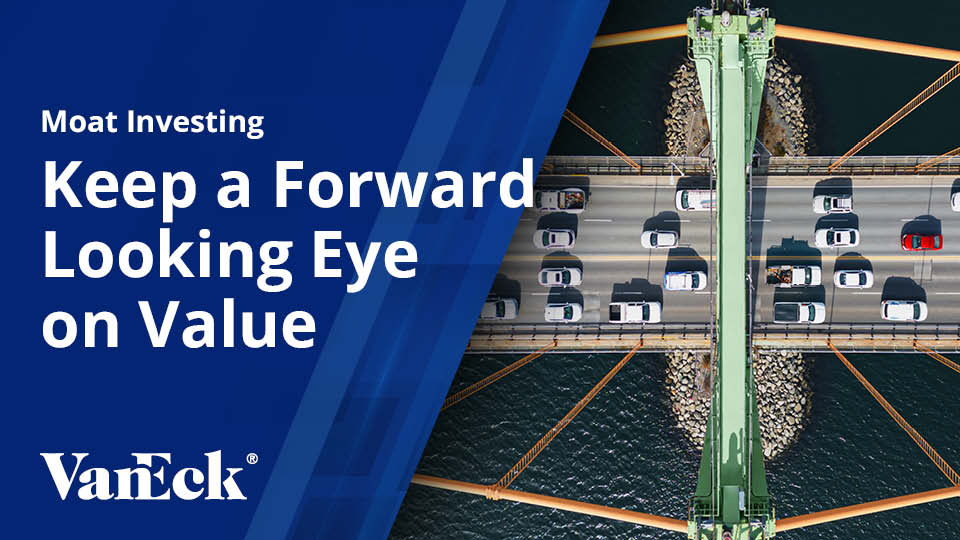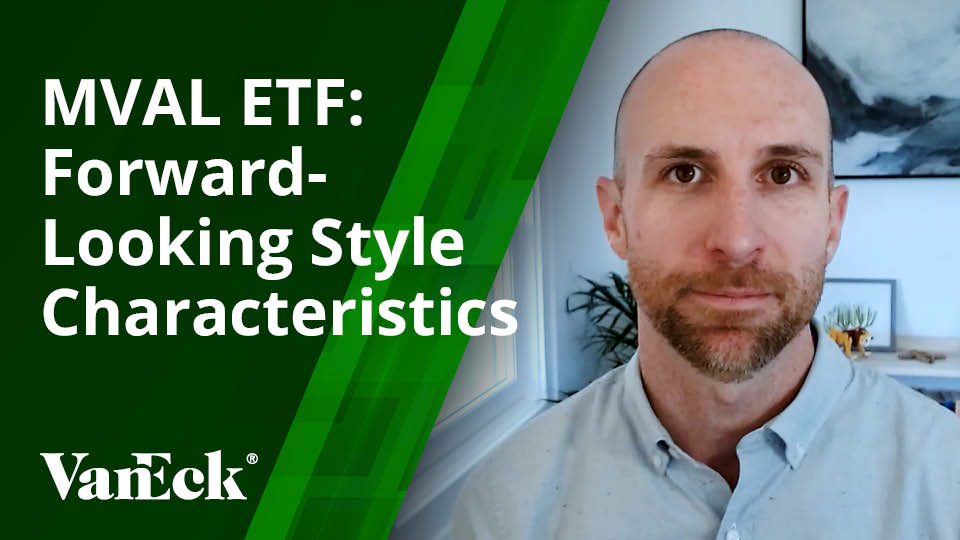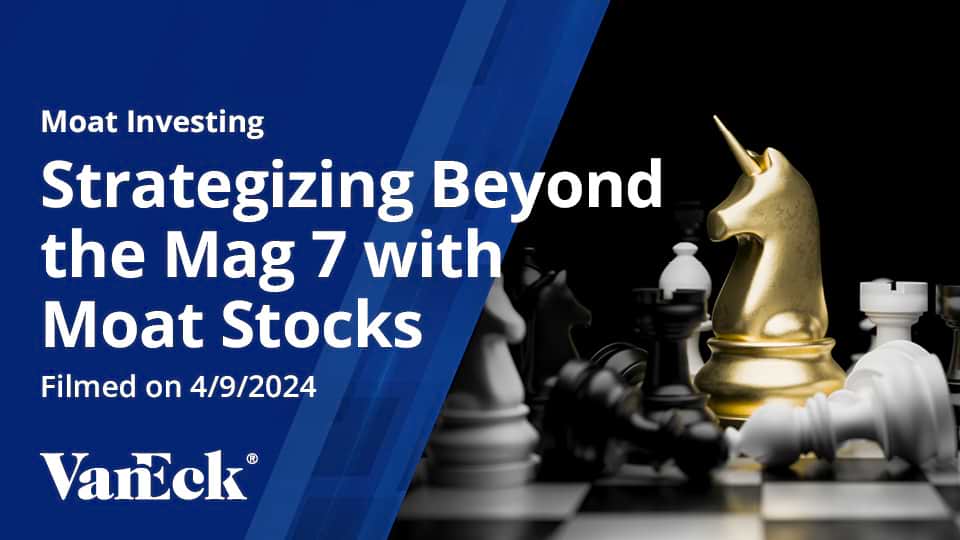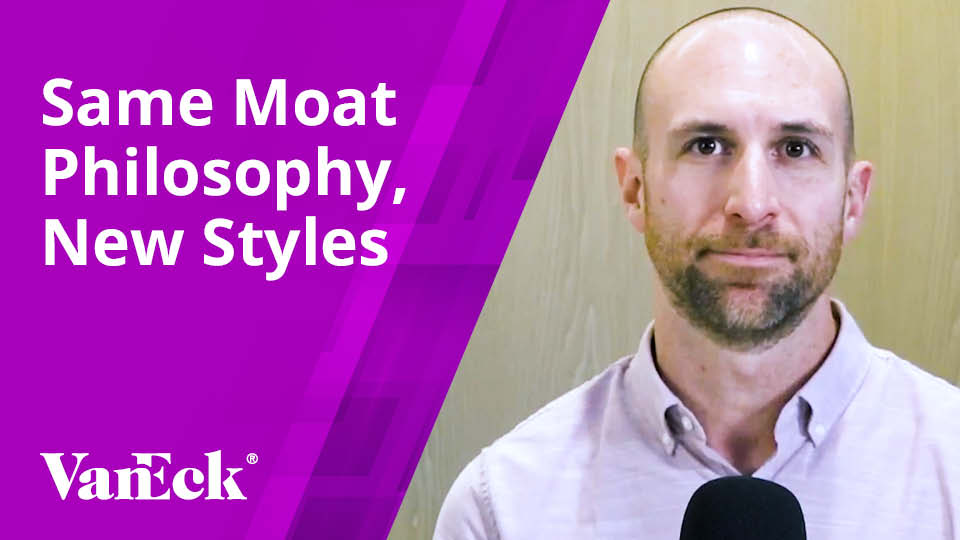Sustainable Moat Investing: Assessing ESG Risk
April 20, 2022
Read Time 4 MIN
Morningstar® US Sustainability Moat Focus IndexSM combines Morningstar’s proven equity research process of identifying companies with long-lasting competitive advantages and attractive valuations with Sustainalytics’ industry-leading ESG (environmental, social and governance) research. The Index focuses on three proprietary ESG criteria when selecting companies for inclusion: ESG Risk, Controversy, and Carbon Risk. Here we will explore the Sustainalytics ESG Risk Rating.
Morningstar US Sustainability Moat Focus Index Methodology
Source: Morningstar.
Sustainalytics ESG Risk Rating
The Sustainalytics ESG Risk Rating is Morningstar’s broad-based, flagship ESG risk assessment. It is forward-looking in nature and identifies a company’s financial exposure to material ESG risks that are specific to its industry and that company itself. Sustainalytics then determines how successfully a company has managed those ESG risks. The remaining unmanaged ESG risks form the basis for its ESG Risk Rating, which spans from Negligible to Severe.
ESG Risk Rating Building Blocks
Three considerations form the foundation of Sustainalytics’ ESG Risk Rating: Corporate Governance, Material ESG Issues and Idiosyncratic Issues.
Corporate Governance impacts all companies and is a foundational element of the Sustainalytics framework. It reflects their conviction that poor Corporate Governance poses material risks for companies that can have negative financial consequences.
Material ESG Issues are focused on a topic, or set of related topics, that require a common set of management initiatives or a similar type of oversight. Human Capital issues, for example, revolve around the management of human resources. Business Ethics focuses on the management of general professional ethics from taxation and accounting to anti-competitive practices. Another example of a Material ESG Issue is Emissions, Effluents and Waste, which focuses on the management of a company’s impact to air, water and land from their own operations. There are approximately 20 Material ESG Issues identified by Sustainalytics and each is considered, if applicable to a company’s business model, in their ESG Risk Rating.
Idiosyncratic Issues are those additional risks that are considered unpredictable or unexpected. Examples of Idiosyncratic Issues are accounting scandals, bribery scandals, or other “black swan” events.
Identify Manageable vs. Unmanageable Risks to Measure Unmanaged Risk
The ESG Risk Rating is predicated on identifying the level of a company’s unmanaged ESG risk. To that end, Sustainalytics identifies the manageable and unmanageable risks applicable to each company and their respective industry. Of a company’s total ESG risk, some portion simply cannot be addressed by management practices. For example, an oil and gas exploration and production company cannot eliminate the carbon emissions risks associated with its business practices. Those companies can manage other ESG risks such as employee safety and human rights issues, among others.
Once manageable ESG risks are identified, Sustainalytics assesses the extent to which those risks have been managed. The “management gap,” reflecting manageable risks that have not been managed, are combined with unmanageable ESG risks to form a company’s total unmanaged risks, which are represented by its ESG Risk Rating.
Measuring Unmanaged ESG Risk
Source: Morningstar.
Absolute ESG Risk Rating System
The ESG Risk Rating is absolute, meaning that a company operating in the energy sector can be compared to a company in the consumer discretionary sector. ESG Risk Ratings place companies in five risk categories ranging from Negligible to Severe. The Morningstar US Sustainability Moat Focus Index will include only those companies with ESG Risk Ratings of Negligible, Low or Medium.
ESG Risk Rating Categories
Source: Morningstar.
A Sustainable Approach to Moat Investing
Many of the most popular sustainable investment strategies seek to offer broad exposure to market indexes while applying some level of exclusionary or inclusionary ESG screens. This may reduce ESG risk in a portfolio, but does not address other performance drivers. The Morningstar US Sustainability Moat Focus Index’s unique combination of forward-looking equity research and ESG screening offers investors a U.S. equity strategy that seeks to provide investors with attractive risk-adjusted returns while mitigating ESG risks.
VanEck Morningstar ESG Moat ETF (MOTE) seeks to replicate as closely as possible, before fees and expenses the price and yield performance of the Morningstar US Sustainability Moat Focus Index.
To learn more about VanEck’s sustainability-related solutions and receive more Moat Investing and Sustainable Investing insights, sign up in our subscription center.
Related Topics
Related Insights
April 10, 2024
Important Disclosures
The information presented does not involve the rendering of personalized investment, financial, legal, or tax advice. Certain statements contained herein may constitute projections, forecasts and other forward looking statements, which do not reflect actual results, are valid as of the date of this communication and subject to change without notice. Information provided by third party sources are believed to be reliable and have not been independently verified for accuracy or completeness and cannot be guaranteed. The information herein represents the opinion of the author(s), but not necessarily those of VanEck.
Fair value estimate: the Morningstar analyst's estimate of what a stock is worth.
Price/Fair Value: ratio of a stock's trading price to its fair value estimate.
The Morningstar® US Sustainability Moat Focus IndexSM was created and is maintained by Morningstar, Inc. Morningstar, Inc. does not sponsor, endorse, issue, sell, or promote the VanEck Morningstar ESG Moat ETF and bears no liability with respect to that ETF or any security. Morningstar® is a registered trademark of Morningstar, Inc. Morningstar® US Sustainability Moat Focus IndexSM is a service mark of Morningstar, Inc.
The Morningstar US Sustainability Moat Focus Index consists of U.S. companies screened for ESG risks and identified as having long-term competitive advantages and whose stocks are the most attractively priced, according to Morningstar.
VanEck Morningstar ESG Moat ETF’s ESG strategy could cause it to perform differently compared to funds that do not have an ESG focus. The Fund’s ESG strategy may result in the Fund investing in securities or industry sectors that underperform other securities or underperform the market as a whole. The companies included in the US Sustainability Moat Focus Index may differ from companies included in other indices that use similar ESG screens. The Fund is also subject to the risk that the companies identified by the Index provider do not operate as expected when addressing ESG issues. Additionally, the Index provider’s proprietary valuation model may not perform as intended, which may adversely affect an investment in the Fund. Regulatory changes or interpretations regarding the definitions and/or use of ESG criteria could have a material adverse effect on the Fund’s ability to invest in accordance with its ESG strategy.
An investment in the VanEck Morningstar ESG Moat ETF may be subject to risks which include, among others, ESG investing strategy risks, investing in equity securities, consumer discretionary, financials, industrials and information technology sectors, medium-capitalization companies, market, operational, high portfolio turnover, index tracking, authorized participant concentration, new fund, absence of prior active market, trading issues, passive management, fund shares trading, premium/discount risk and liquidity of fund shares, non-diversification and concentration risks, which may make these investments volatile in price or difficult to trade. Medium-capitalization companies may be subject to elevated risks.
ESG investing is qualitative and subjective by nature, and there is no guarantee that the factors utilized by VanEck or any judgment exercised by VanEck will reflect the opinions of any particular investor. Information regarding responsible practices is obtained through voluntary or third-party reporting, which may not be accurate or complete, and VanEck is dependent on such information to evaluate a company’s commitment to, or implementation of, responsible practices. Socially responsible norms differ by region. There is no assurance that the socially responsible investing strategy and techniques employed will be successful.
Sustainable Investing Considerations: Sustainable investing strategies aim to consider and in some instances integrate the analysis of environmental, social and governance (ESG) factors into the investment process and portfolio. Strategies across geographies and styles approach ESG analysis and incorporate the findings in a variety of ways. Incorporating ESG factors or Sustainable Investing considerations may inhibit the portfolio manager’s ability to participate in certain investment opportunities that otherwise would be consistent with its investment objective and other principal investment strategies.
Investing involves substantial risk and high volatility, including possible loss of principal. An investor should consider a Fund's investment objective, risks, charges and expenses carefully before investing. To obtain a prospectus and summary prospectus for VanEck Funds and VanEck ETFs, which contain this and other information, call 800.826.2333 or visit vaneck.com. Please read the prospectus and summary prospectus for VanEck Funds and VanEck ETFs carefully before investing.
Related Funds
Important Disclosures
The information presented does not involve the rendering of personalized investment, financial, legal, or tax advice. Certain statements contained herein may constitute projections, forecasts and other forward looking statements, which do not reflect actual results, are valid as of the date of this communication and subject to change without notice. Information provided by third party sources are believed to be reliable and have not been independently verified for accuracy or completeness and cannot be guaranteed. The information herein represents the opinion of the author(s), but not necessarily those of VanEck.
Fair value estimate: the Morningstar analyst's estimate of what a stock is worth.
Price/Fair Value: ratio of a stock's trading price to its fair value estimate.
The Morningstar® US Sustainability Moat Focus IndexSM was created and is maintained by Morningstar, Inc. Morningstar, Inc. does not sponsor, endorse, issue, sell, or promote the VanEck Morningstar ESG Moat ETF and bears no liability with respect to that ETF or any security. Morningstar® is a registered trademark of Morningstar, Inc. Morningstar® US Sustainability Moat Focus IndexSM is a service mark of Morningstar, Inc.
The Morningstar US Sustainability Moat Focus Index consists of U.S. companies screened for ESG risks and identified as having long-term competitive advantages and whose stocks are the most attractively priced, according to Morningstar.
VanEck Morningstar ESG Moat ETF’s ESG strategy could cause it to perform differently compared to funds that do not have an ESG focus. The Fund’s ESG strategy may result in the Fund investing in securities or industry sectors that underperform other securities or underperform the market as a whole. The companies included in the US Sustainability Moat Focus Index may differ from companies included in other indices that use similar ESG screens. The Fund is also subject to the risk that the companies identified by the Index provider do not operate as expected when addressing ESG issues. Additionally, the Index provider’s proprietary valuation model may not perform as intended, which may adversely affect an investment in the Fund. Regulatory changes or interpretations regarding the definitions and/or use of ESG criteria could have a material adverse effect on the Fund’s ability to invest in accordance with its ESG strategy.
An investment in the VanEck Morningstar ESG Moat ETF may be subject to risks which include, among others, ESG investing strategy risks, investing in equity securities, consumer discretionary, financials, industrials and information technology sectors, medium-capitalization companies, market, operational, high portfolio turnover, index tracking, authorized participant concentration, new fund, absence of prior active market, trading issues, passive management, fund shares trading, premium/discount risk and liquidity of fund shares, non-diversification and concentration risks, which may make these investments volatile in price or difficult to trade. Medium-capitalization companies may be subject to elevated risks.
ESG investing is qualitative and subjective by nature, and there is no guarantee that the factors utilized by VanEck or any judgment exercised by VanEck will reflect the opinions of any particular investor. Information regarding responsible practices is obtained through voluntary or third-party reporting, which may not be accurate or complete, and VanEck is dependent on such information to evaluate a company’s commitment to, or implementation of, responsible practices. Socially responsible norms differ by region. There is no assurance that the socially responsible investing strategy and techniques employed will be successful.
Sustainable Investing Considerations: Sustainable investing strategies aim to consider and in some instances integrate the analysis of environmental, social and governance (ESG) factors into the investment process and portfolio. Strategies across geographies and styles approach ESG analysis and incorporate the findings in a variety of ways. Incorporating ESG factors or Sustainable Investing considerations may inhibit the portfolio manager’s ability to participate in certain investment opportunities that otherwise would be consistent with its investment objective and other principal investment strategies.
Investing involves substantial risk and high volatility, including possible loss of principal. An investor should consider a Fund's investment objective, risks, charges and expenses carefully before investing. To obtain a prospectus and summary prospectus for VanEck Funds and VanEck ETFs, which contain this and other information, call 800.826.2333 or visit vaneck.com. Please read the prospectus and summary prospectus for VanEck Funds and VanEck ETFs carefully before investing.



